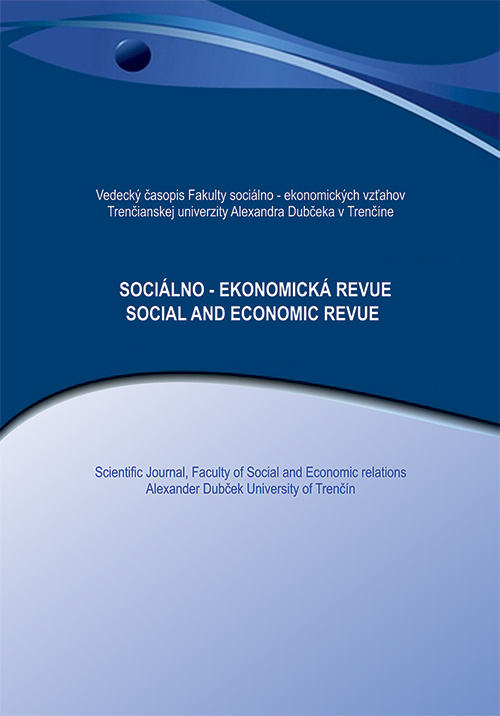EXTERNAL SUPPORT OF START-UPS
Start-up is a very small, beginning enterprise that has a business idea, but it is almost lacking all the resources needed to develop a business, including experiences. Extremely fast growth and scalability cannot be ensured by internal resources from organic growth, so start-up will be dependent on an external support. The aim of the research was to find out how start-ups perceive the form and degree of external support from larger and established companies, government/state administration and universities, start-up scene and investors. Research has shown that the most effective and most accepted support is provided by the start-up scene and investors, apparently less support comes from larger established enterprises, support from the state/government and universities is little expected and accepted. The key to suitable support is to investigate the motivation of providers and recipients of support and to understand the asymmetry of their relationships. The extent and quality of start-up support from larger and established companies depends on mutual expectations. Support of start-ups from government and higher education institutions has the lowest effect among all external actors. Support from investors is accepted most among the evaluated impacts. Investors with their resources are a vital condition for running the start-up.
Release: 2018/3 Pages: 6-14 JEL classification: M13, L26, L25
DOI:
Keywords: Start-up, state/government support of business, universities, bigger and established companies, start-up scene, investors
Section: SOCIAL AND ECONOMIC DEVELOPMENT
Contacts:
Štefan Slávik, prof.
Department of Management
Faculty of Business Management
University of Economics in Bratislava
Dolnozemská 1/b
851 02 Bratislava
Slovakia
e-mail: stefan.slavik@euba.sk
Eliška Záležáková, PhD.
Department of Management
Faculty of Business Management
University of Economics in Bratislava
Dolnozemská 1/b
851 02 Bratislava
Slovakia
e-mail: eliska.zalezakova@euba.sk
Literature:
Blank, S. - Dorf, B. (2012). The start-up owner᾽s manual. The step-by-step guide for building a great company. K&S Ranch Publishing Division.
Bliemel, M. J. (2014). Getting entrepreneurship education out of the classroom and into students’ heads. Entrepreneurship Research Journal, ISSN 2157-5665, 4 (2).
http://www.forbes.com/sites/natalierobehmed/2013/12/16/what-is-a-startup/.
Kiska, A. (2017). Venture kapitál v praxi na příkladu Credo Ventures. Approachable from: http://www.tyinternety.cz/startupy/kiska-venture-kapital-v-praxi-na-prikladu-credo-ventures/.
Kolektív (2015). Start-up for dummies. Digital Visions. Koncepcia pre podporu startupov a rozvoj startupového ekosystému v SR.
Národný Holdingový Fond. (2015). [online] [cit. 28.8. 2015]. Approachable from: http://www.nhfond.sk/.
Prieskum slovenského startup ekosystému 2014. (2014). KPMG in Slovakia, Bratislava.
Program na podporu startupov. (2015). Ministerstvo hospodárstva SR [online] [cit. 28.8. 2015]. Approachable from: http://www.sbagency.sk/statne-programy.
Rae, D., Martin, L., Antcliff, V., Hannon, P. (2012). Enterprise and entrepreneurship in English higher education: 2010 and beyond. Journal of Small Business and Enterprise Development, 19 (3).
Ranga, M., Hoareau, C., Durazzi, N., Etzkowitz, H., Marcucci, P., Usher, A. (2013). Study on university-business cooperation in the US. EAC-2011-0469. London: LSE Enterprise Limited. The London School of Economics and Political Science.
Ries, E. (2011). The lean start-up. Crown Business, New York.
Stagars, M. (2014). University Start-ups and Spin-Offs: Guide for Entrepreneurs in Academia. New York: Apress.
Startup Ecosystem Survey. Slovakia 2016. (2016). KPMG in Slovakia, Bratislava.
Start-up Survey. (2013). Summary of findings of KPMGʼs 2013 Start-up Survey. KPMG in Slovakia, Bratislava.
Swamidass, P. M. (2013). University start-ups as a commercialization alternative: lessons from three contrasting case studies. The Journal of Technology Transfer. 38 (6).
Thiel, P. (2014). Zero to one. Notes on start-ups, or how to build the future. Crown Business, New York.


